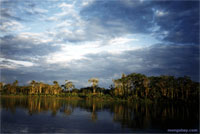 |
|
Jungle police fight to protect rain forest
Financial Times
By Raymond Colitt
November 17, 2003
http://www.nytimes.com/financialtimes/business/FT1066565950188.html
On an idyllic river bank in a remote part of the Amazon jungle, a landing helicopter shakes the forest canopy and sends parakeets shrieking into the air. The pilot rushes to a camouflaged tent and reports to his commander a huge clearing being cut into the forest nearby. They check the co-ordinates on a computer, for property rights and environmental permits, call headquarters by satellite phone, and send ground troops to arrest the perpetrators and confiscate their equipment.
The site, some 200km south-west of the town of Arum�, is one of the hotspots of deforestation in the Amazon rain forest.
The successful raid illustrates the growing control efforts by the special task force of Ibama, Brazil's environmental protection agency, to help slow alarming deforestation rates in the world's largest rain forest. Last year some 25,000 sq km were chopped down, 55 per cent more than previous annual averages.
Ibama's jungle police has become far more effective recently. In spite of a 15 per cent budget cut this year to only R$28m ($9.5m, ?8.1m, �5.6m) for environmental law enforcement in the entire country, Ibama has increased large-scale raids to 32 and fines by 50 per cent to 5,400, over last year. "We are trying to do more with less money," says Marcelo Marquesini, head of Ibama's control operations.
Yet the long list of obstacles it faces illustrates how difficult it is to preserve the world's largest source of biodiversity, fresh water and carbon absorption.
The logistical challenges are daunting. To use the helicopter, barrels of kerosene have to be brought in on a pick-up truck from Porto Velho, a three-day drive away. A missing spare part for the power generator, which runs the computers and radios, halted the Arum� operation for 10 days.
Word of Ibama's presence in a region often spreads quickly: lumbermen and farm hands armed with chain saws and shotguns escape on motorcycles, chopping down trees to block their pursuit.
They seldom reveal the identity of their employers, who usually live in distant towns. Recently Ibama began imposing fines for environmental damage on properties rather than their owners to inhibit the trade of illegally cleared land.
Yet all these efforts appear a drop in the ocean against the growing population tide and expansion of the country's booming agriculture, which has dramatically increased pressure on natural resources in recent years.
"Deforestation in the Amazon is the result of Brazil moving north," says Adilson Cordeiro, Ibama's chief inspector in the state of Amazonas, where a relatively intact forest - only 4 per cent has been destroyed - is now coming under pressure like other states in the region. In neighbouring Para, deforestation has claimed an area the size of Austria, Holland, Portugal and Switzerland together. "We cannot stop a country [growing] but we can try to direct its expansion and thereby limit deforestation," says Mr Cordeiro.
Clearing up to 20 per cent of a forest on private property is legal in the Amazon and that alone would ensure significant deforestation for years. Under a government settlement policy, impoverished peasants are given a plot of land for housing and small-scale horticulture.
Yet by far the largest perpetrators of deforestation are wealthy farmers and cattle ranchers who illegally occupy federal land and hire farm hands to slash and burn it. The ministry of agriculture rejects such claims, suggesting they are part of efforts by farming countries to block Brazilian farm products. Yet the advance of the agricultural frontier is evident to any visitor and well known to police, Ibama and other government agencies.
In the town of Humait�, some 200km north-east of Porto Velho, farmers from as far south as the border with Argentina and Uruguay are planting soyabeans not only on savannahs but on illegally cleared forest ground. Timber companies, even those practising selective logging, accelerate the process by opening roads, later used by settlers and farmers.
The illegal occupation, clearing and sale of land often occurs with the help of local politicians and registrars who falsify property titles. The process, which occasionally includes the murder of local residents, is well documented in an extensive report by Greenpeace, the environmental campaign group, last month. "It is no exaggeration to say there is an undeclared war going on in the forest," the report said, "a struggle for land and forest at any cost for quick profit."
CONTENT COPYRIGHT THE FINANCIAL TIMES. THIS CONTENT IS INTENDED SOLELY FOR EDUCATIONAL PURPOSES.
|
 A Place Out of Time:
A Place Out of Time:
Tropical Rainforests - Their Wonders and the Perils They Face. Information on rainforests, biodiversity, and environmental concerns.
|
|